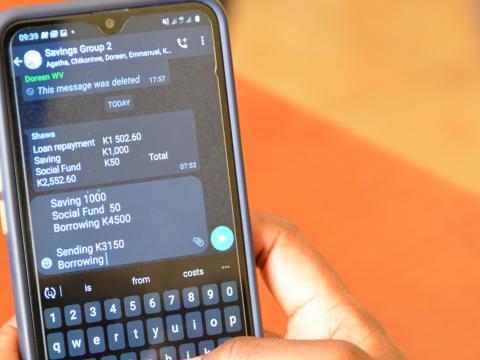Village banking still thriving despite COVID-19

The effects of the novel coronavirus are having a devastating impact on all spheres of life. Beyond the immediate threat to life, COVID-19 is also adversely affecting socio-economic activities such as businesses and growing investments through savings. Despite the restrictions that the pandemic has presented though, staff savings groups at World Vision are still thriving. All the groups have revolutionised and adapted to the new ‘normal’ of conducting their monthly investments.
As opposed to physical monthly meetings, an alternative means of continuing to grow their investments when meetings are discouraged has been embraced by the savings groups. Currently, groups use online and mobile money banking methods. Group leaders are not only playing their part in protecting members from potential exposure to the disease, but also working to ensuring that financial needs for the groups continue to be met.
This response arises from the adherence of the prescribed preventative measures of observing social distancing, avoiding crowded gatherings, and reducing physical transactions of money during their monthly meetings.
Mr. Kambani Phiri, a treasurer for the “Dare to Discover” savings group, also works as World Vision’s Communications Officer. In his group, Mr. Phiri explaina that they adopted the mobile money banking service as a safety measure to protect members from potential exposure to the novel coronavirus. He explains that he and his fellow group members previously used to meet monthly to conduct their savings transactions.
“Before the coronavirus disease, our group used to meet physically at the office every last Friday of the month, and people would arrive to the meetings with ready cash that would be saved and borrowed during the meetings. However, since the start of COVID-19, we have changed our approach and decided to be conducting our transactions through mobile money services,’’ he says. “We now have virtual meetings; I send reminders a week before the transaction day for members to share their schedule of how much they intended to save and borrow so that we can understand how much money will be available to the group when transactions are made the following week.”
Currently, money is directly sent through mobile money to members who wish to a get loans.
“For instance, if someone is saving K3,000 and another person wants a loan of K3,000, the one saving will directly send the money to the one that intends to borrow, and the transactions are then recorded,’’ explains Mr. Phiri.
The 'Dare to Discover' treasurer explains that the new mode of transactions has proved to be efficient and effective for the group as members have not only adjusted to the change but also abiding by the rules of conduct. He further explains that to cushion the costs of mobile money transactions for members, the groups opted to channel ‘social funds’ to meet mobile money transaction charges. A social fund is a small contribution made by the group, not included as savings but acts as insurance to members during times of immediate need.
“Previously, social funds were used to assist members with major life events such as funerals and weddings and at times buying snacks during meetings or birthday gifts for members but since we do not meet in person anymore, we use the money to cater for the expenses that come from mobile money transactions”, adds Mr. Phiri.
Misheck Shimuneka, a Sponsorship Officer, is a member of another savings group called 'Nest Savings Group'. Mr. Shimuneka narrates that since the outbreak of the COVID-19 pandemic, the savings group had to find alternative ways of operating: “For transparency, we decided to open a bank account that at least has three signatories. We don’t hold physical meetings anymore but post our money transactions on our social media platforms,” he says.
He further adds that to show transparency in the transaction of activities, members provide receipts as proof to the rest of the group members: “The new model of saving has proved to be efficient as there are fewer irregularities compared to physically handling money during meetings. This action has increased the levels of trust and transparency’’ he adds.
Meanwhile, National Office Savings Group member Ms. Maureen Nkhoma explains that whilst she misses the monthly fellowship and interactions with group members; she has adjusted to the new normal of banking using mobile money services.
“I miss the fellowship with fellow group members as it gave us time to interact and share ideas on social issues as well as ways of improving the operations of the group, but the introduction of mobile money banking has been convenient as it can be done anywhere, “explains Ms. Nkhoma. “This new method adopted by the group is proving to be efficient for everyone because we transact from anywhere for as long as one has a mobile money account.”
Ms. Nkhoma concludes by emohasising that it is important for savings groups around the country to adjust to the new normal if they are to survive.